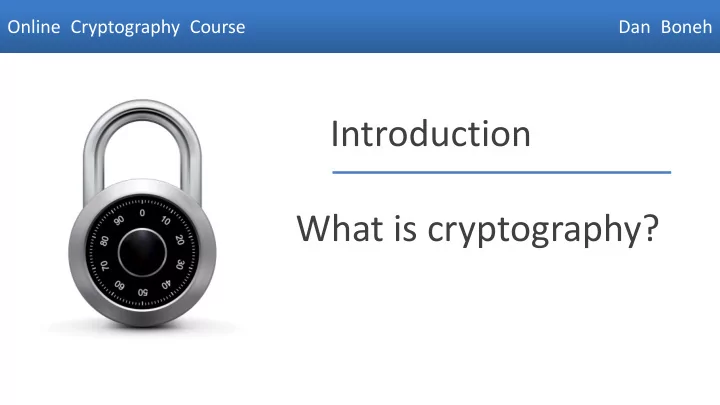

Online Cryptography Course Dan Boneh Online Cryptography Course Dan Boneh Introduction What is cryptography? Dan Boneh
Crypto core Talking Talking Talking Talking to Alice to Alice to Bob to Bob Alice Secret key establishment: Bob attacker??? m 1 Secure communication: k k m 2 confidentiality and integrity Dan Boneh
But crypto can do much more • Digital signatures • Anonymous communication Alice Alice Who did I Who did I signature signature just talk to? just talk to? Alice Bob Dan Boneh
But crypto can do much more • Digital signatures • Anonymous communication • Anonymous digital cash – Can I spend a “digital coin” without anyone knowing who I am? – How to prevent double spending? Who was Who was 1$ Alice that? that? Internet (anon. comm.) Dan Boneh
Protocols • Elections • Private auctions Dan Boneh
Protocols • Elections • Private auctions trusted trusted Goal: compute f(x 1 , x 2 , x 3 , x 4 ) authority authority “ Thm :” anything the can done with trusted auth. can also be done without • Secure multi-party computation Dan Boneh
Crypto magic • Privately outsourcing computation What did she What did she search for? search for? search E[ query ] query Alice E[ results ] results • Zero knowledge (proof of knowledge) ??? ??? Alice I know the factors of N !! N= p∙q N Bob p roof π Dan Boneh
A rigorous science The three steps in cryptography: • Precisely specify threat model • Propose a construction • Prove that breaking construction under threat mode will solve an underlying hard problem Dan Boneh
Online Cryptography Course Dan Boneh Online Cryptography Course Dan Boneh Introduction History Dan Boneh
History David Kahn, “The code breakers” (1996) Dan Boneh
Symmetric Ciphers Dan Boneh
Few Historic Examples (all badly broken) 1. Substitution cipher k := Dan Boneh
Caesar Cipher (no key) Dan Boneh
What is the size of key space in the substitution cipher assuming 26 letters? | ࣥ | = 26 = 26! ( 26 factorial) | ࣥ | = 2 26 | ࣥ | = 26 2 Dan Boneh
How to break a substitution cipher? What is the most common letter in English text? “X” “L” “E” “H” Dan Boneh
How to break a substitution cipher? (1) Use frequency of English letters (2) Use frequency of pairs of letters (digrams) Dan Boneh
An Example UKBYBIPOUZBCUFEEBORUKBYBHOBBRFESPVKBWFOFERVNBCVBZPRUBOFERVNBCVBPCYYFVUFO FEIKNWFRFIKJNUPWRFIPOUNVNIPUBRNCUKBEFWWFDNCHXCYBOHOPYXPUBNCUBOYNRVNIWN CPOJIOFHOPZRVFZIXUBORJRUBZRBCHNCBBONCHRJZSFWNVRJRUBZRPCYZPUKBZPUNVPWPCYVF ZIXUPUNFCPWRVNBCVBRPYYNUNFCPWWJUKBYBIPOUZBCUIPOUNVNIPUBRNCHOPYXPUBNCUB OYNRVNIWNCPOJIOFHOPZRNCRVNBCUNENVVFZIXUNCHPCYVFZIXUPUNFCPWZPUKBZPUNVR E IN THE B 36 NC 11 UKB 6 AT N 34 PU 10 RVN 6 T U 33 UB 10 FZI 4 A P 32 UN 9 trigrams C 26 digrams Dan Boneh
2. Vigener cipher (16’th century, Rome) k = C R Y P T O C R Y P T O C R Y P T (+ mod 26) m = W H A T A N I C E D A Y T O D A Y c = Z Z Z J U C L U D T U N W G C Q S s uppose most common = “H” first letter of key = “H” – “E” = “C” Dan Boneh
3. Rotor Machines (1870-1943) Early example: the Hebern machine (single rotor) A A K K E E N N B B S S K K E E C C T T S S K K . . . . T T S S . . . . . . T T X X R R . . . . Y Y N N R R . . key Z Z E E N N R R Dan Boneh
Rotor Machines (cont.) Most famous: the Enigma (3-5 rotors) # keys = 26 4 = 2 18 (actually 2 36 due to plugboard) Dan Boneh
4. Data Encryption Standard (1974) DES: # keys = 2 56 , block size = 64 bits Today: AES (2001) , Salsa20 (2008) (and many others) Dan Boneh
Recommend
More recommend